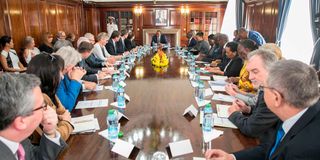European Union -Kenya trade: The future is ours

Then-President Uhuru Kenyatta meets envoys from 18 European Union member states in 2019, ahead of a Kenya Private Sector Alliance-EU Business Council forum at State House, Nairobi. Also present are DP William Ruto and UN Secretary-General António Guterres.
What you need to know:
- To deepen these relationships, the EU is organising a two-day EU-Kenya Business Forum in Nairobi.
- The EU and its member states are in constant dialogue with the government on how to make it easier to do business.
The European Union is Kenya’s largest trading partner with the most extensive market access of all its export destinations. The 27 member states are among Kenya’s main sources of foreign direct investment (FDI).
To deepen these relationships, the EU is organising a two-day EU-Kenya Business Forum in Nairobi. More than 200 EU companies and an equal number of Kenyan businesses will meet today and tomorrow to facilitate business opportunities in many sectors. Also, government representatives will share their plans to attract investment and possibilities for new economic activities.
As the President William Ruto-led government sets out an ambitious and important agenda for a people-centred and bottom-up approach to economic growth and development, European businesses and investors can be important partners to underpin this endeavour across sectors such as agriculture, healthcare, digitalisation and innovation.
The forum will be an important opportunity to discuss how this trade and investment relationship can evolve and how the private sectors in Europe and Kenya can work together to face global challenges, in particular the climate crisis and food security.
Trade and investment
The environmental aspect of trade and investment will play an increasing role in the future. Not only do we all need to move to a much more circular economy but also production processes have to become more environmentally sustainable. Furthermore, the ecological footprint of the logistical chains between the EU and Kenya forms an important part of this discussion.
The EU has adopted different types of legislation that support this transition. Also, maybe even more importantly, EU consumers are becoming more conscious about the origin and the environmental footprint of the goods they buy and the food they eat.
The EU is renowned for its innovative small- and medium-sized businesses, 15 EU countries are among the 25 most innovative economies and more than 80 per cent of the European GDP is earned by SMEs. This innovative power in engineering, digital solutions and many other sectors is available to Kenyan entrepreneurs who wish to work together with EU-based companies.
Signing deals and contracts
And, although the private sector is leading in signing deals and contracts, the EU and its member states support and facilitate this process, including through the Global Gateway. This focuses on hard infrastructure, connectivity and technology transfers within an enabling environment. It provides transformative large-scale projects that combine public and private financing for investments based on EU values and standards.
Seeking and establishing these connections will be the underpinning aim of the forum.
Kenya has shown great leadership and potential. Which is why the EU wishes to collaborate with Kenya even further and wants the country to be at the forefront of connecting in the Global Gateway. Kenya beats any EU member state in the percentage of energy that comes from renewable sources, young people establishing tech start-ups are numerous and has a great entrepreneurial spirit.
The elements for green economic growth supported by sound digital connections are all there but may benefit from a conducive business environment to flourish. Investors need to feel safe and secure before putting their money into new ventures in Kenya. A predictable and efficient policy, regulatory and tax environment are essential for this.
Transparent governmental decision-making and fair and equal treatment are at the foundation for investments. Many investors from the EU trade with Kenya for many years before investing in the country. It is thus useful for Kenya to facilitate trade, rather than penalise traders, for example through punitive import duties, to encourage investment.
The EU and its member states are in constant dialogue with the government on how to make it easier to do business. As development partners, we are always willing to support, inter alia, the Judiciary, the land registry and various agencies and departments of the Ministry of Trade, to increase the attractiveness of Kenya for investors, to further economic activity and create more quality jobs.
We as EU ambassadors look forward to a successful forum and to a continued dialogue with the government and the Kenyan private sector and a swift conclusion of the Economic Partnership Agreement to grow the Kenyan economy for everyone’s benefit.
This article was written by the EU Ambassador to Kenya and the Ambassadors of 18 Member States represented in Kenya. @EUinKenya @EUAmbKenya




